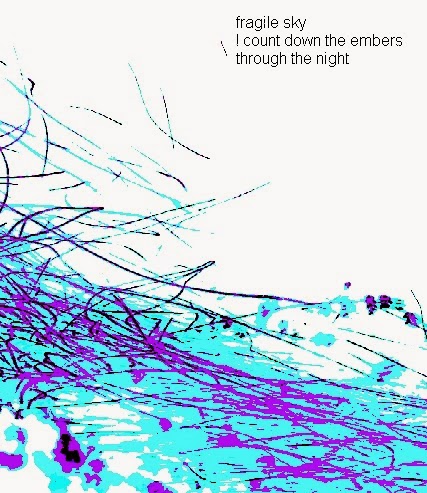 |
| Rooster Moans image. |
Example of a haibun (prose with haiku)
The Crow
Star
fading
last note
a
torresian crow calls out
a
star-scarred sky
now…
so, so, so black this black sky of stars
more bright than I've ever seen
some seem to shift and move vibrate to suggest something more
last sighting on this
travel of Jupiter above Venus
the
southern cross
my
woodsmoke embers
spiral
upwards
quiet and dark
then a rustle reminds me of the Dreamtime Dingo
white and
feral imagination lends fear to a night that leers at me
woodfire
flickering with light
the
shadows of horses
it's
cold now 3a.m. brittle cutting cold
the
moon's no longer full
this
brutal simplicity of a night
deep
as a raven’s compassion
a
susurrus of moths
around
fire that flickers on
a
thinning trail
to the
stars
woodsmoke
& embers
an
early hours crow
I
invoke another prayer
to its
god and mine
I see a lightening from dark to
metal grey
a quickening between trees
that becomes a hurt violet into brush strokes into morning
red-rimmed
sunrise
the trees rekindle
fire
through
a blur of blue
Haibun by Alan Summers (this
version March 2014)
Versions published:
Paper Wasp, Queensland, 1997; Azami haiku journal, Osaka, Japan 1998; Blithe Spirit Vol. 14 No. 2 June 2004; Haiku Hike project, June 2006 (Haiku Hike (World Walks) part of Crossover UK’s 2006 ‘Renewability’ project (2006); Shamrock Haiku Journal, Irish Haiku Society, Spring 2006; Sketchbook, eJournal for Eastern & Western Short Forms Nov. 2007; RWP online version September 2009; Land of the Rising Haibun: Setting Japanese Poetry Forms in Prose, 2014: http://us4.campaign-archive1.com/?u=bb3dc7ead7e8fcce474c593af&id=be21868c01
Anthology Credits:
Journeys 2015, An Anthology of International Haibun
ed. Angelee Deodhar ISBN 978-1515359876
Shamrock Haiku Journal: 2007 - 2011 ed. Anatoly Kudryavitsky (December 2011 ISBN-10: 1470938308 ISBN-13: 978-1470938307
except for the Rooster Moans title image.
Land of the Rising Haibun: Setting Japanese Poetry Forms in Prose
Robert Lowell said "almost the whole problem of writing poetry is to bring it back to what you really feel, and that takes an awful lot of manoeuvring".The joy of haibun and its sister form "tanka prose" - and perhaps the reason why they are catching the imagination of writers in English - is that they bring an extra opportunity to manoeuvre, juxtaposing the verse against the prose, creating new works that can even surprise ourselves.
Using excerpts, handouts, and examples of haibun, we will delve into the work of famous practitioners such as Matsuo Basho, and from outside Japan, poet/novelist Jack Kerouac and others.
The two prose/poetry forms we'll explore and write are:
Haibun: prose pieces in various styles from prose poetry to journalistic writing, travel writing, diary entries, long fiction through to flash fiction. These prose narratives usually include one or more haiku inside the body of prose, or can start or conclude the body of prose.
Tanka Prose: a 21st Century narrative, with roots in previous centuries, combining short five-line tanka poems that carry over a thousand years of history behind them. Tanka, grounded in concrete images infused with intimacy, and emotion tempered with implication, suggestion, and nuance, leap in and out of linear narrative with lateral, and dynamic, reverie.
We will cover the history of these two genres as well as concentrate on how to make them 21st narratives both in the haiku and tanka tradition, but also modern short stories and/or memories/memoirs, and literary non-fiction.
He has won awards, been published internationally and translated into 15 languages. Alan helped his American team win Japan Times Best Renga of 2002. He’s a co-editor of five haiku anthologies: Parade of Life: Poems inspired by Japanese Prints; The Poetic Image - Haiku and Photography; Fifty-Seven Damn Good Haiku, Press Here; Four Virtual Haiku Poets; and c.2.2. Themes of Loss of Identity and/or Name. He has been General Secretary of the British Haiku Society and a Foundation Member of the Australian Haiku Society. Alan is currently editor with contemporary haiku magazine Bones, and is working on The Kigo Lab, a project to use the potential of Western haiku seasons for eco-critical writing.
Alan has a haiku pamphlet called The In-Between Season (2012), and a shortverse and contemporary haiku collection called Does Fish-God Know, (2012).
Course weblink:
http://www.poetrycoop.com/poetry-workshops/land-rising-haibun-setting-japanese-poetry-forms-prose
.

























